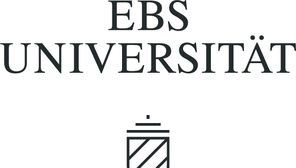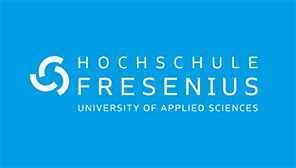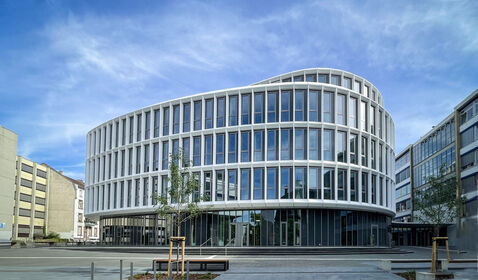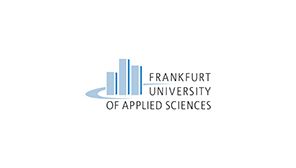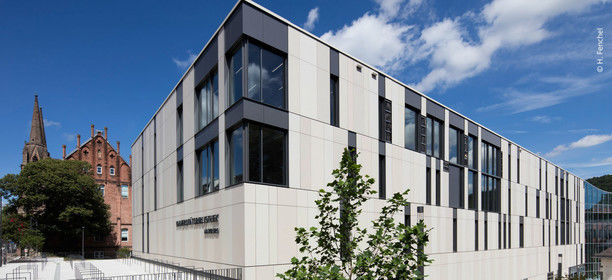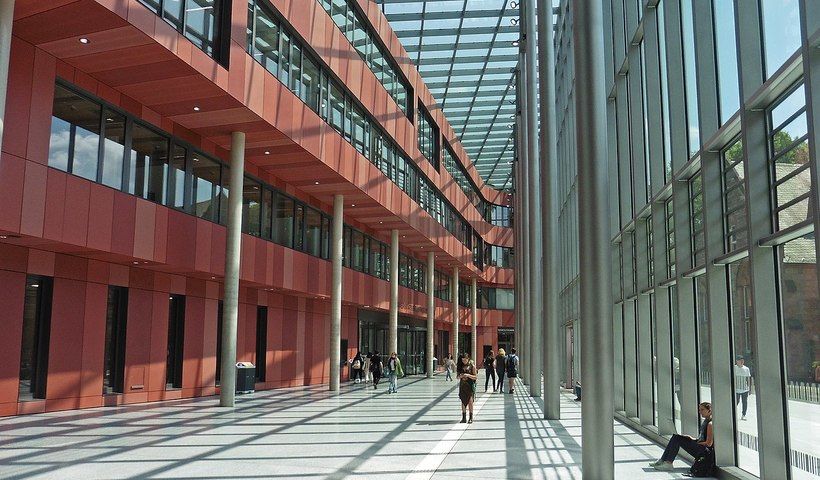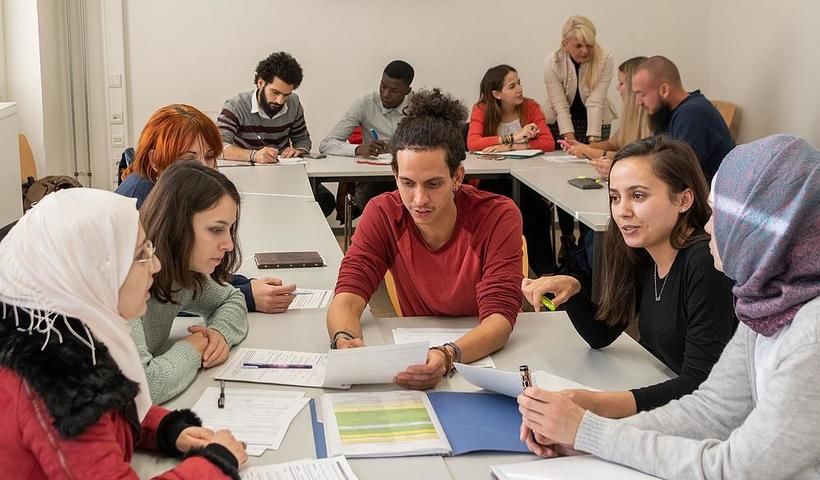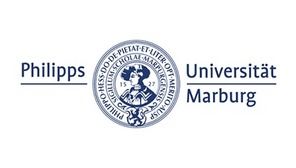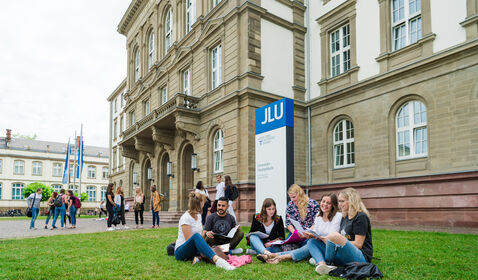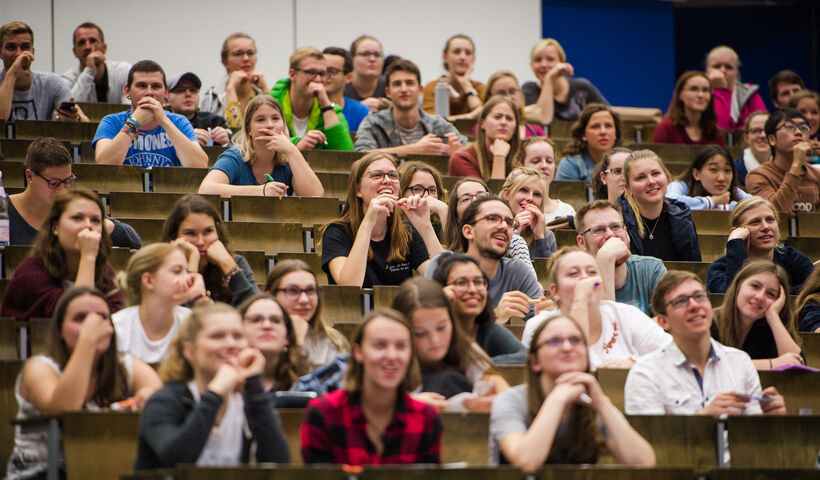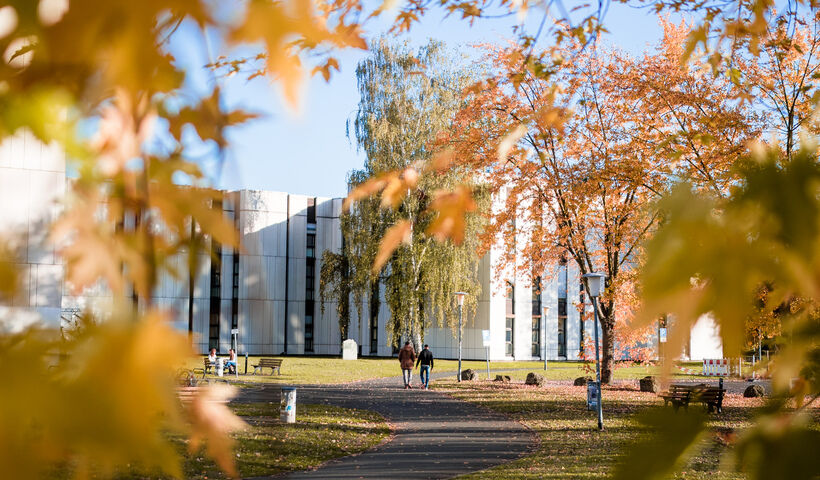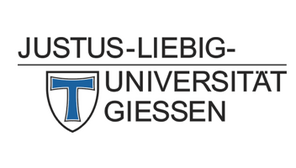Hochschule RheinMain, University of Applied Sciences Wiesbaden, Rüsselsheim
- Promotionsrecht: Ja
- Trägerschaft: öffentlich-rechtlich
- 1971 gegründet
- 12.945 Studierende
Kurt-Schumacher-Ring 18
65197 Wiesbaden
Tel: 0611 9495-01
Hochschule im CHE-Ranking abschneiden.
Die Hochschule RheinMain, University of Applied Sciences Wiesbaden, Rüsselsheim gehört zu den Fachhochschulen / HAW.
Ja, du kannst an der Hochschule RheinMain, University of Applied Sciences Wiesbaden, Rüsselsheim promovieren.
Die Hochschule RheinMain, University of Applied Sciences Wiesbaden, Rüsselsheim ist eine öffentlich-rechtliche Hochschule. Es gibt staatliche und staatlich anerkannte Hochschulen, die meist in Universitäten, Fachhochschulen (international: University of Applied Sciences) und Kunst- sowie Musikhochschulen unterteilt werden. Der überwiegende Teil der Hochschulen wird vom Staat finanziert und befindet sich daher in staatlicher Trägerschaft. Dort fallen in der Regel nur geringe Semesterbeiträge an. An den privaten Hochschulen hingegen, die sich über private Trägerschaften finanzieren, können wesentlich höhere Studiengebühren anfallen. Einen Weg, die finanziellen Hürden dieser Hochschulen zu umgehen, können Stipendien darstellen.
Es gibt außerdem Hochschulen, die von der protestantischen oder katholischen Kirche betrieben werden.
Die Hochschule RheinMain, University of Applied Sciences Wiesbaden, Rüsselsheim wurde im Jahr 1971 gegründet.
Insgesamt gibt es 12945 Studierende an der Hochschule RheinMain, University of Applied Sciences Wiesbaden, Rüsselsheim.
Standorte dieser Hochschule sind Wiesbaden und Rüsselsheim.
Hier findest du die Fristen und Termine für deine Bewerbung:
- Vorlesungszeit:
-
14.10.2024 - 01.02.2025Siehe auch die Webseite: www.hs-rm.de/semestertermine
- Studienanfänger:
-
01.06.2024 - 01.10.2024Bitte beachten Sie unbedingt auch die Informationen auf der Webseite der Hochschule RheinMain unter: www.hs-rm.de/bewerbung
- Hochschulwechsler:
-
01.06.2024 - 01.10.2024Bitte beachten Sie unbedingt auch die Informationen auf der Webseite der Hochschule RheinMain unter: www.hs-rm.de/bewerbung
- International Studierende aus der Europäischen Union:
-
Bis 01.09.2024Bitte beachten Sie unbedingt auch die Informationen auf der Webseite der Hochschule RheinMain unter: www.hs-rm.de/bewerbung-international
- International Studierende aus Staaten, die nicht Mitglied der EU sind:
-
Bis 01.09.2024Bitte beachten Sie unbedingt auch die Informationen auf der Webseite der Hochschule RheinMain unter: www.hs-rm.de/bewerbung-international
- Studienanfänger:
-
01.06.2024 - 15.07.2024Bitte beachten Sie unbedingt auch die Informationen auf der Webseite der Hochschule RheinMain unter: www.hs-rm.de/bewerbung
- Hochschulwechsler:
-
01.06.2024 - 15.07.2024Bitte beachten Sie unbedingt auch die Informationen auf der Webseite der Hochschule RheinMain unter: www.hs-rm.de/bewerbung
- International Studierende aus der Europäischen Union:
-
Bis 15.07.2024Bitte beachten Sie unbedingt auch die Informationen auf der Webseite der Hochschule RheinMain unter: www.hs-rm.de/bewerbung-international
- International Studierende aus Staaten, die nicht Mitglied der EU sind:
-
Bis 15.07.2024Bitte beachten Sie unbedingt auch die Informationen auf der Webseite der Hochschule RheinMain unter: www.hs-rm.de/bewerbung-international
- Studienanfänger:
-
01.06.2024 - 01.10.2024Die Bewerbungsfrist für zulassungsfreie Masterstudiengänge endet zu unterschiedlichen Zeiten. Bitte Hinweise auf der Webseite beachten: www.hs-rm.de/bewerbung
- Hochschulwechsler:
-
01.06.2024 - 01.10.2024Die Bewerbungsfrist für zulassungsfreie Masterstudiengänge endet zu unterschiedlichen Zeiten. Bitte Hinweise auf der Webseite beachten: www.hs-rm.de/bewerbung
- International Studierende aus der Europäischen Union:
-
Bis 01.09.2024Bitte beachten Sie unbedingt auch die Informationen auf der Webseite der Hochschule RheinMain unter: www.hs-rm.de/bewerbung-international
- International Studierende aus Staaten, die nicht Mitglied der EU sind:
-
Bis 01.09.2024Bitte beachten Sie unbedingt auch die Informationen auf der Webseite der Hochschule RheinMain unter: www.hs-rm.de/bewerbung-international
- Studienanfänger:
-
01.06.2024 - 15.07.2024Die Bewerbungsfrist für Masterstudiengänge endet zu unterschiedlichen Zeiten. Bitte Hinweise auf der Webseite beachten: www.hs-rm.de/bewerbung
- Hochschulwechsler:
-
01.06.2024 - 15.07.2024Bitte beachten Sie unbedingt auch die Informationen auf der Webseite der Hochschule RheinMain unter: www.hs-rm.de/bewerbung
- International Studierende aus der Europäischen Union:
-
Bis 15.07.2024Bitte beachten Sie unbedingt auch die Informationen auf der Webseite der Hochschule RheinMain unter: www.hs-rm.de/bewerbung-international
- International Studierende aus Staaten, die nicht Mitglied der EU sind:
-
Bis 15.07.2024Bitte beachten Sie unbedingt auch die Informationen auf der Webseite der Hochschule RheinMain unter: www.hs-rm.de/bewerbung-international
- Vorlesungszeit:
-
15.04.2024 - 20.07.2024Siehe auch die Webseite: www.hs-rm.de/semestertermine
- Studienanfänger:
-
Die Frist ist abgelaufen
- Hochschulwechsler:
-
Die Frist ist abgelaufen
- International Studierende aus der Europäischen Union:
-
Die Frist ist abgelaufen
- International Studierende aus Staaten, die nicht Mitglied der EU sind:
-
Die Frist ist abgelaufen
- Studienanfänger:
-
Die Frist ist abgelaufen
- Hochschulwechsler:
-
Die Frist ist abgelaufen
- International Studierende aus der Europäischen Union:
-
Die Frist ist abgelaufen
- International Studierende aus Staaten, die nicht Mitglied der EU sind:
-
Die Frist ist abgelaufen
- Studienanfänger:
-
Die Frist ist abgelaufen
- Hochschulwechsler:
-
Die Frist ist abgelaufen
- International Studierende aus der Europäischen Union:
-
Die Frist ist abgelaufen
- International Studierende aus Staaten, die nicht Mitglied der EU sind:
-
Die Frist ist abgelaufen
- Studienanfänger:
-
Die Frist ist abgelaufen
- Hochschulwechsler:
-
Die Frist ist abgelaufen
- International Studierende aus der Europäischen Union:
-
Die Frist ist abgelaufen
- International Studierende aus Staaten, die nicht Mitglied der EU sind:
-
Die Frist ist abgelaufen
- Vorlesungszeit:
-
14.10.2024 - 01.02.2025Siehe auch die Webseite: www.hs-rm.de/semestertermine
- Studienanfänger:
-
01.06.2024 - 01.10.2024Bitte beachten Sie unbedingt auch die Informationen auf der Webseite der Hochschule RheinMain unter: www.hs-rm.de/bewerbung
- Hochschulwechsler:
-
01.06.2024 - 01.10.2024Bitte beachten Sie unbedingt auch die Informationen auf der Webseite der Hochschule RheinMain unter: www.hs-rm.de/bewerbung
- International Studierende aus der Europäischen Union:
-
Bis 01.09.2024Bitte beachten Sie unbedingt auch die Informationen auf der Webseite der Hochschule RheinMain unter: www.hs-rm.de/bewerbung-international
- International Studierende aus Staaten, die nicht Mitglied der EU sind:
-
Bis 01.09.2024Bitte beachten Sie unbedingt auch die Informationen auf der Webseite der Hochschule RheinMain unter: www.hs-rm.de/bewerbung-international
- Studienanfänger:
-
01.06.2024 - 15.07.2024Bitte beachten Sie unbedingt auch die Informationen auf der Webseite der Hochschule RheinMain unter: www.hs-rm.de/bewerbung
- Hochschulwechsler:
-
01.06.2024 - 15.07.2024Bitte beachten Sie unbedingt auch die Informationen auf der Webseite der Hochschule RheinMain unter: www.hs-rm.de/bewerbung
- International Studierende aus der Europäischen Union:
-
Bis 15.07.2024Bitte beachten Sie unbedingt auch die Informationen auf der Webseite der Hochschule RheinMain unter: www.hs-rm.de/bewerbung-international
- International Studierende aus Staaten, die nicht Mitglied der EU sind:
-
Bis 15.07.2024Bitte beachten Sie unbedingt auch die Informationen auf der Webseite der Hochschule RheinMain unter: www.hs-rm.de/bewerbung-international
- Studienanfänger:
-
01.06.2024 - 01.10.2024Die Bewerbungsfrist für zulassungsfreie Masterstudiengänge endet zu unterschiedlichen Zeiten. Bitte Hinweise auf der Webseite beachten: www.hs-rm.de/bewerbung
- Hochschulwechsler:
-
01.06.2024 - 01.10.2024Die Bewerbungsfrist für zulassungsfreie Masterstudiengänge endet zu unterschiedlichen Zeiten. Bitte Hinweise auf der Webseite beachten: www.hs-rm.de/bewerbung
- International Studierende aus der Europäischen Union:
-
Bis 01.09.2024Bitte beachten Sie unbedingt auch die Informationen auf der Webseite der Hochschule RheinMain unter: www.hs-rm.de/bewerbung-international
- International Studierende aus Staaten, die nicht Mitglied der EU sind:
-
Bis 01.09.2024Bitte beachten Sie unbedingt auch die Informationen auf der Webseite der Hochschule RheinMain unter: www.hs-rm.de/bewerbung-international
- Studienanfänger:
-
01.06.2024 - 15.07.2024Die Bewerbungsfrist für Masterstudiengänge endet zu unterschiedlichen Zeiten. Bitte Hinweise auf der Webseite beachten: www.hs-rm.de/bewerbung
- Hochschulwechsler:
-
01.06.2024 - 15.07.2024Bitte beachten Sie unbedingt auch die Informationen auf der Webseite der Hochschule RheinMain unter: www.hs-rm.de/bewerbung
- International Studierende aus der Europäischen Union:
-
Bis 15.07.2024Bitte beachten Sie unbedingt auch die Informationen auf der Webseite der Hochschule RheinMain unter: www.hs-rm.de/bewerbung-international
- International Studierende aus Staaten, die nicht Mitglied der EU sind:
-
Bis 15.07.2024Bitte beachten Sie unbedingt auch die Informationen auf der Webseite der Hochschule RheinMain unter: www.hs-rm.de/bewerbung-international
- Vorlesungszeit:
-
15.04.2024 - 20.07.2024Siehe auch die Webseite: www.hs-rm.de/semestertermine
- Studienanfänger:
-
Die Frist ist abgelaufen
- Hochschulwechsler:
-
Die Frist ist abgelaufen
- International Studierende aus der Europäischen Union:
-
Die Frist ist abgelaufen
- International Studierende aus Staaten, die nicht Mitglied der EU sind:
-
Die Frist ist abgelaufen
- Studienanfänger:
-
Die Frist ist abgelaufen
- Hochschulwechsler:
-
Die Frist ist abgelaufen
- International Studierende aus der Europäischen Union:
-
Die Frist ist abgelaufen
- International Studierende aus Staaten, die nicht Mitglied der EU sind:
-
Die Frist ist abgelaufen
- Studienanfänger:
-
Die Frist ist abgelaufen
- Hochschulwechsler:
-
Die Frist ist abgelaufen
- International Studierende aus der Europäischen Union:
-
Die Frist ist abgelaufen
- International Studierende aus Staaten, die nicht Mitglied der EU sind:
-
Die Frist ist abgelaufen
- Studienanfänger:
-
Die Frist ist abgelaufen
- Hochschulwechsler:
-
Die Frist ist abgelaufen
- International Studierende aus der Europäischen Union:
-
Die Frist ist abgelaufen
- International Studierende aus Staaten, die nicht Mitglied der EU sind:
-
Die Frist ist abgelaufen





